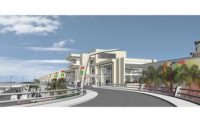Architect-engineer CannonDesign doesn't simply serve markets, it burrows into them with a fervor and fluidity that blurs lines among its operations in Chicago, St. Louis and more than a dozen other locations.
Core practice groups headquartered in Chicago, including health, corporate/commercial and sustainable design, not only serve Midwest clients, but inform the growth and direction of corresponding practices in other regions. Likewise, a core education group headquartered in New York City and science and technology group headquartered in Washington, D.C., lend their expertise to operations in the Midwest.
"We're not geographically based," says Thomas C. Bergmann, operations and practice leader for the central region, the firm's Chicago and St. Louis offices included. "We're not one of those firms that says, 'You take everything west of this office and we'll take everything east.' Nor does, say, our Chicago office say, 'We need every available service on hand in Chicago or we can't function.'"
For the latest phase of Roche Diagnostic's $300-million campus in Indianapolis, a project involving a trio of new structures, CannonDesign's St. Louis office is performing architecture, its Chicago office interior design and both offices engineering services.
"We're a firm without walls," says firm principal Chip Berry, who oversees regional engineering operations from firm headquarters in Grand Island, N.Y. "We allocate resources where they're needed."
It's a strategy that has served the firm well. Last year alone, regional annual revenue leaped more than 25%, to $66 million from $50 million, on the strength of projects that include a $100-million expansion of St. Louis College of Pharmacy's 213,000-sq-ft academic and research facility; Zurich North America's $300-million, 735,000-sq-ft headquarters in Schaumburg, Ill, reputedly the largest build-to-suit facility under construction in the U.S.; and City Colleges of Chicago's $251-million, 500,000-sq-ft Malcolm X College School of Health.
To further promote growth, CannonDesign has begun engaging in services far afield of traditional design. Practice groups have acquired the expertise to serve clients both upstream and downstream of projects in areas ranging from organizational and financial modeling to workplace strategy and commissioning, regardless of whether the firm is retained as the project's architect or engineer.
"We typically compete for the design work, as we do for other projects, and if we're not selected, we don't view that as a failure," says Bergmann. "Our approach is to get in front of the curve before there is a project so we can serve as a trusted source of advice. Our groups also gain insight into how clients think."
The practice groups, many recently created, resulted from a company-wide restructuring to enhance client engagement in key markets. "You could say the objective was to function as a client-focused enterprise [rather] than a project-focused one," says Berry.







